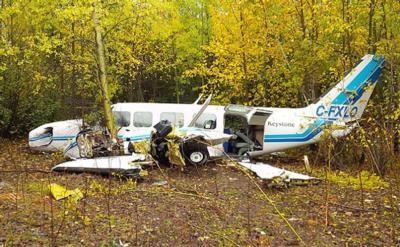Thu, Sep 08, 2016
Plane With Eight On Board Went Down Shortly After Takeoff
A Transportation Safety Board of Canada (TSB) investigation report (A15C0134) released Tuesday shows that the use of an incorrect fuel type led to a forced landing in a forest near Thompson, Manitoba, in September 2015. The occupants sustained varying serious injuries.

According to the report, on September 15, 2015 at 1817 Central Daylight Time, a Keystone Air Service Ltd. (Keystone) Piper PA-31-350 departed Thompson Airport on an instrument flight rules flight to Winnipeg/James Armstrong Richardson International Airport with two pilots and six passengers on board. Shortly after takeoff, both engines began to lose power. The crew attempted to return to the airport, but the aircraft was unable to maintain altitude. The landing gear was extended in preparation for a forced landing on a highway southwest of the airport. However, because of vehicle traffic, the crew chose to conduct the forced landing in a forested area next to the highway.
The investigation found that the aircraft had been fueled with the incorrect type of aircraft fuel. The piston-engined Piper PA-31-350 requires AVGAS, but it was refuelled with Jet-A1 fuel, which is used for gas turbine engines. The incorrect fuel caused a loss of power from both engines, and made it necessary for the crew to conduct a forced landing. A number of defenses implemented to prevent such fuelling errors failed. In particular, a flared spout, meant for use on Jet-A1 fuel filler openings, was replaced with a spout to enable the delivery of Jet-A1 fuel into the PA-31's smaller fuel tank openings. The fuelling operations were also not adequately supervised by the flight crew, and the fuel slip indicating that Jet-A1 fuel had been delivered was not available for their review.
Following the occurrence, an urgent memo by Keystone's management was circulated to all its pilots, reiterating the importance of crew supervision of aircraft fuelling in compliance with the company's operations manual.
A post-accident inspection conducted by Transport Canada (TC) revealed safety concerns that resulted in the suspension of Keystone's air operator certificate. TC subsequently conducted an in-depth review of Keystone's aviation safety record and cancelled its air operator certificate, citing public interest and the company's aviation safety record.
(Source: TSB news release. Image contained in report)
More News
Klyde Wonders If The 'New' SouthWest Can 'Out-Spirit' Spirit... FMI: www.klydemorris.com>[...]
From 2012 (YouTube Edition): Extensive Expertise in Backup Solutions Makes MCIA Uniquely Qualified In This Market There's no such thing, in aviation, as TOO much caution... hence t>[...]
Aero Linx: Historic Aircraft Association (HAA) The Historic Aircraft Association (HAA) was founded in 1979 with the aim of furthering the safe flying of historic aircraft in the UK>[...]
Jamming Denotes emissions that do not mimic Global Navigation Satellite System (GNSS) signals (e.g., GPS and WAAS), but rather interfere with the civil receiver's ability to acquir>[...]
"Respectfully, U.S. and European airlines should not be even contemplating the future purchase of airplanes from Chinese military companies...” Source: US Representative Raja>[...]
 Klyde Morris (05.02.25)
Klyde Morris (05.02.25) Classic Aero-TV: Introducing The MD302--Mid-Continent's Standby Attitude Module
Classic Aero-TV: Introducing The MD302--Mid-Continent's Standby Attitude Module ANN's Daily Aero-Linx (05.04.25)
ANN's Daily Aero-Linx (05.04.25) ANN's Daily Aero-Term (05.04.25): Jamming
ANN's Daily Aero-Term (05.04.25): Jamming Aero-News: Quote of the Day (05.04.25)
Aero-News: Quote of the Day (05.04.25)



